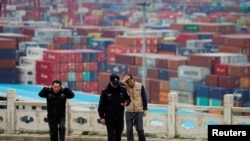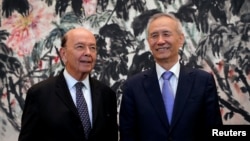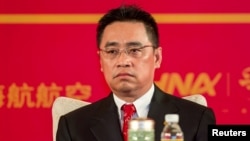China is bracing for the impact of the 25 percent tariffs the United States is set to impose Friday on $34 billion worth of Chinese imports.
Among other things, China is threatening to retaliate with tariffs of its own, and has tightened media censorship to play down the impact and planned monetary easing to boost confidence in the country’s financial and exchange markets.
But Chinese economists warn of continued market turmoil and tough times ahead if trade frictions with the U.S. protract.
Tightened censorship
According to a six-point censorship plan leaked and circulated online, Chinese media are prohibited from relaying comments from the U.S. government or media reports without responses from China’s Ministry of Commerce.
Calmness and rationality are required at this stage, it says, citing words of China’s vice premier Liu He.
Demanding all to contribute to the stabilization of market expectations, the instruction portrayed the trade war as one that is “against China’s rise, to see who has the greater stamina.”
It also said Chinese authorities have stopped negotiation, acted in a reciprocal manner and controlled public opinion to avoid escalation while planning to drive a wedge among different U.S. groups.
While being urged to “prepare well for protracted conflicts,” Chinese media are told not to attack U.S. President Donald Trump’s “vulgarity.”
“Don’t make this a war of insults,” it adds, reiterating earlier censors on China’s own policy “Made in China 2025,” an industrial goal to upgrade China into a high-tech superpower.
Critical voices silenced
Critical voices and unwanted comments online have thus been silenced.
On Wednesday, an online post that read “the local economy has entered its darkest hour” was top-trending on freeweibo.com, a website that collects posts that China has taken down.
It was only replaced by the topic of HNA Group the next day after its chairman’s sudden death made headlines.
Also suppressed was another post, which compared China’s official comments with the market reality.
The post read, when Chinese officials said “we have confidence,” it actually meant that “the market is in a bad shape” while “economic fundamentals are sound” means “economic prospects are harsh.”
The post then interpreted official words “we have confidence in stabilizing the stock market” as “the downturn has just begun” and “we will protect the interests of investors” as a warning for the investors to expect “the impact of a Ponzi-like scheme.”
Shots of confidence
Censored online comments are in stark contrast to top-ranking Chinese officials’ attempts to inject shots of confidence into the local economy.
On Monday, a top economic committee, chaired by Vice Premier Liu, concluded that China’s “huge domestic market size offers great leeway for it to win big risk control battles and cope with external risks,” according to a State Council press statement.
The committee, which comprises Chinese President Xi Jinping’s most-trusted officials, is responsible for containing economic and financial risks, the statement added.
The committee is likely behind the central bank’s decision Tuesday to support the yuan, a stance that might have contributed to the end of the currency’s longest losing streak Wednesday.
The central bank also plans to implement a reserve requirement ratio cut by 50 basis points July 5, one day before the exchange of punitive tariffs between China and the United States.
Some analysts said the rate cut demonstrates China’s determination to safeguard its economy and its room to cushion on the trade war’s possible impact.
Room to cushion impact?
But others disagree.
Oliver Rui, professor of finance and accounting at China Europe International Business School (CEIBS), says a lose-lose situation is in sight.
“It’s kind of difficult to manage the financial markets unless you stop all the trading. Once there’s trading, people will use their action to reflect the real assessment on this trade war,” he said.
Lu Suiqi, associate professor of economics at Peking University, said that because investors’ pessimistic sentiment is hard to manage, the stock markets’ downward swing will be inevitable in the future.
“China’s level of dependence on the U.S. market is greater than that of the U.S. on the Chinese market. Shall the trade war escalate, China will have to pay a bigger price,” Lu said.
Jin Canrong, associate dean of Renmin University’s school of international studies, however, said China is in a position to hit back.
He told a forum Wednesday that China can further retaliate by limiting U.S.-bound exports of rare earth metals, which are essential for wide-ranging technologies such as smartphones, according to Chinese media reports.
China can also dump its holdings of U.S. Treasuries and shove China-based U.S. businesses’ market shares, although these two moves will also hurt China, he admitted.









